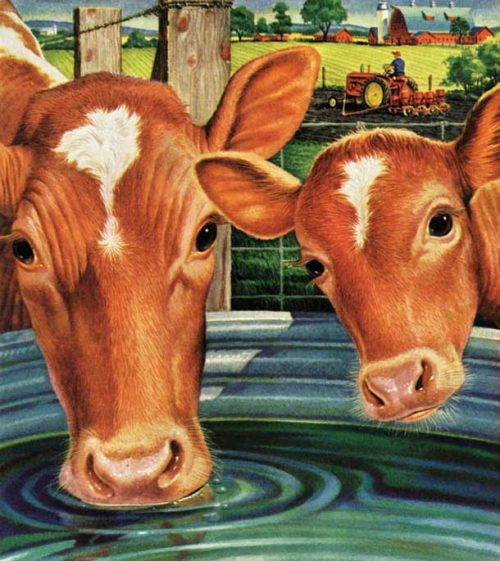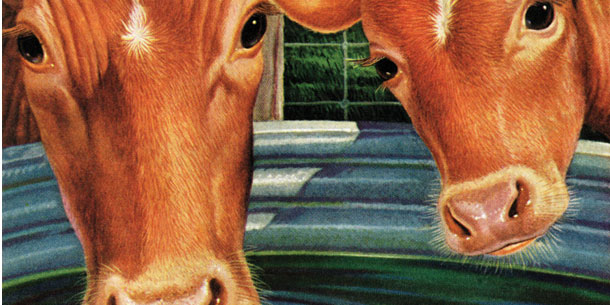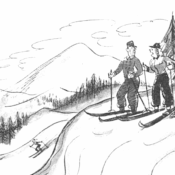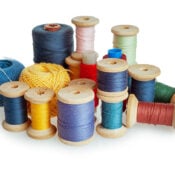In 1843, my wife’s family settled along Youngs Creek in Orange County, Indiana, and has been there ever since. We grow hay, which for years got cut, baled, and fed to our neighbors’ cattle. Then my son, in a burst of entrepreneurial spirit, decided to eliminate the customer and raise the cattle himself, so we fenced in the hay field, bought some cows, and turned them loose to dine al fresco.
It’s good to have cattle back in the fields, to sit on the porch on a summer evening and watch cows gather under the trees by the creek. If everyone had a cow to look at, it would cut the rates of depression and anxiety in half. Unless they owned the cow and had to worry about selling it for a profit, which is nearly impossible these days.
The cattle and I are skittish around one another, so we’re working to establish trust, mindful of boundaries, limiting our exchanges to polite greetings — except when one is sick and I have to distract it with a cowboy song while my son jabs it with a needle. “Happy Trails” and “Red River Valley” are especially popular with the bovine crowd, even more so when accompanied by a guitar, like in the old movies with Roy Rogers and Dale Evans, which is where I learned everything I know about cows.
To the uninformed, cows seem like easy money, nibbling contentedly at the grass, but the average cow is a disaster waiting to happen, prone to a variety of poxes, viruses, and oddities, despite its hardy appearance. One cow snuck a stem of alfalfa, got bloated with gas, and exploded before our very eyes. It didn’t even blow up into convenient pieces, like New York strips, T-bones, and filets.

Cows have an unerring knack for eating the one thing they shouldn’t. Our barn is 100 years old, and when my wife’s great-grandfather built it, he inadvertently dropped a nail on the ground. A century later, a cow came along and ate it. This is so common a problem that veterinarians have a name for it — hardware disease. A dozen cows will watch while another cow eats a nail and flops over dead, and an hour later will do the same thing themselves. Cows have many virtues, but intelligence isn’t one of them.
Nevertheless, one persists with cattle in the grim hope that after buying the land, building the barn, stringing the fence, paying for feed, hiring the vet, and growing the herd, there will be a modest profit. But moneywise, one would come out ahead working the hamburger line at McDonald’s. One forgets all that when sitting on the porch on a summer evening, watching the cows chew their way across the pasture toward the trees along the creek. Then they seem like a painting, as if Johannes Vermeer decided to paint a cow instead of a girl with a pearl earring. I could have bought a Vermeer painting for what I’ve spent on our cows. I could have lined the walls of every room in my house with cow paintings, been surrounded by serene cows doing cow things, without having to feed one, or get up at three on a March morning to check on a birthing cow, or keep my eyes peeled for the lurking nail.
When our friends ask how things are going, I smile and give them a thumbs-up. “Couldn’t be better,” I say. But they see the worry lines, the baggy eyes, the limp from when the heifer stepped on my foot, the stooped back from lifting bales of hay, and know otherwise. Cows, I have learned, will make a liar out of the most honest of men.
Philip Gulley is a Quaker pastor and the author of 22 books, including the Harmony and Hope series featuring Sam Gardner.
This article is featured in the September/October 2017 issue of The Saturday Evening Post. Subscribe to the magazine for more art, inspiring stories, fiction, humor, and features from our archives.
Become a Saturday Evening Post member and enjoy unlimited access. Subscribe now




Comments
Love the cow article! No romance in farming unless it’s in a Roy Rogers movie, that’s for sure!